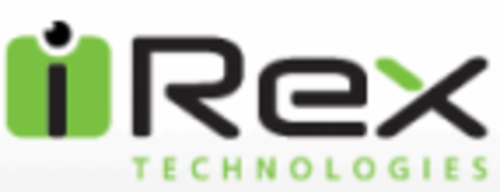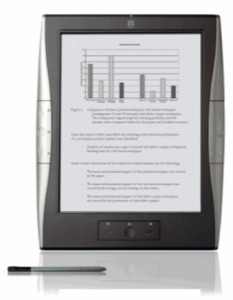When it comes to eReaders, Amazon’s Kindle is obviously the largest player in the U.S., with Sony’s eReader being a distant second. A few days ago, though, we got a chance to talk to Hans Brons, the CEO of iRex. IRex is a company worth watching closely, as it is a spin-off from the e-ink research group at Philips that developed the screen technology that is being used by most current generation eBook readers. Philips decided that it didn’t want to pursue this line of research in 2005 and decided to license the technology to other vendors.

B2B
Unlike other eReader vendors, iRex made the decision to focus almost exclusively on the B2B market early on and focused on this market instead of going directly after consumers. As Brons told us, part of the reason was that the price for first generation eReaders was simply to high for consumers, and in order to jumpstart the business, going after the B2B market was simply a strategic decision. IRex’s eReaders, are, for example, often being used as Electronic Flight Bags by private pilots. Brons also stressed that there is a huge market for books for professionals, including manuals, guides, and similar texts.
Today, iRex is also looking into the textbook market and electronic newspapers, though for the time being, the company is still focusing more on the professional market than on the consumer market.
Taking Notes
We think iRex’s top-of-the-line Digital Reader 1000 devices are especially interesting because they actually feature the ability to take notes directly on the screen (with a pen – no touchscreen yet, but the company is working on this). When we looked at the Kindle DX and its role in the textbook market, we noted that the absence of easy to use note-taking features made the Kindle less useful in a school setting than Amazon made it out to be.

One thing Hans Brons stressed during our interview was that iRex puts a premium on the brightness of its screens. Adding a touchscreen would mean adding an additional layer over the actual screen, which would reduce brightness.
Brons also told us that iRex has approached (and has been approached by) a number of newspaper companies that are looking to provide their readers with eReaders. iRex is not ready to announce any new deals in the U.S. just yet, though the company is working with a number of large European newspapers already, and the Washington Post and USA Today are also available through iRex.
Color
IRex made a bit of a splash a few weeks ago when it announced (PDF) that it was working on full color readers. Brons told us that iRex was getting ready to commercialize color readers, but that this was indeed a hard problem to solve as iRex doesn’t want to sacrifice screen brightness for color, which isn’t necessarily a feature that most users would need.
Services for Publishers, But no Store
Brons also told us that iRex is providing publishers with a full range services to get their books onto the iRex platform, though iRex itself is not looking into starting its own store.
We think there is a chance that iRex is missing some opportunities here, though. Publishers might be able to put their books up in an iRex powered store on their sites, but consumers don’t go to publisher sites to buy a book. After all, who knows (and wants to know) whether their favorite book was published by a Random House imprint like Knopf or Crown, or by Penguin (itself a part of Pearson)?
Brons acknowledged that Amazon’s size must have surely helped it to gather (force?) publishers around its eBook offering, and the integration between the store and the hardware device, bundled with the Kindle’s wireless capabilities, surely helped the company to make eBooks and eReaders more palatable for consumers.
It is important to note, too, that the Kindle and Amazon’s eBook store isn’t currently available in Europe, where iRex has its headquarters and its strongest presence. If iRex could gather enough publishers around its platform and set up a large store, the company would definitely have the potential to challenge Amazon in this market when and if it decides to bring the Kindle to Europe.

















